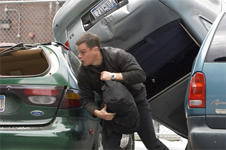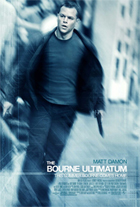The Bourne Ultimatum
|  There have been a lot of threequels this summer--a third Shrek, a third Pirates of the Caribbean, a third Spider-Man--but unlike those, The Bourne Ultimatum feels nothing if not necessary because it genuinely builds on its predecessors. It is the perfect sequel because, rather than relying lazily on the good will generated from previous entries, it deepens our experience, supplying just the right amount of the expected and then challenging us with the unexpected. It is satisfying in the way so few summer movies are, which is all the more surprising given its frequently grim tone and overtly political subject matter. There have been a lot of threequels this summer--a third Shrek, a third Pirates of the Caribbean, a third Spider-Man--but unlike those, The Bourne Ultimatum feels nothing if not necessary because it genuinely builds on its predecessors. It is the perfect sequel because, rather than relying lazily on the good will generated from previous entries, it deepens our experience, supplying just the right amount of the expected and then challenging us with the unexpected. It is satisfying in the way so few summer movies are, which is all the more surprising given its frequently grim tone and overtly political subject matter.Our hero, Jason Bourne (Matt Damon), an amnesiac CIA assassin who has spent the previous two movies trying to figure out who he is, is still in the crosshairs of his former government employer, which views him as an imminent threat. His most dogged new pursuer is Noah Vosen (David Strathairn), the deputy director of the CIA who, working at the behest of CIA director Ezra Kramer (Scott Glenn), wants Bourne dead at all costs. They recruit Pamela Landy (Joan Allen), the former CIA deputy director who tracked Bourne in the previous film. However, Landy is now convinced that Bourne is not a danger and that the real threat is the nefarious backroom dealings in the U.S. intelligence agency, which clearly fears what Bourne might remember. As in the previous films, we get jagged shards of Bourne's flashbacks, this time involving his being brought into some kind of training facility overseen by Dr. Albert Hirsch (Albert Finney)--a place that might hold all the answers to not only who Bourne is, but how he became who he is. The film's political subtext, which frequently ruptures the surface, blatantly questions the nature of ends justifying the means, which is an all-too-pertinent issue in the era of the “War on Terror.” The film never rubs politics in our face, despite the fact that the ostensible villains are the U.S.'s highest ranking intelligence officers, but rather uses politics to underscore the importance of the action. It should also be noted that, despite the obvious critiques the film mounts of power justifying itself, The Bourne Ultimatum is not a cynical film, ending as it does in a kind of fantasy in which the system actually works. Thus, it is not the system that is under fire, but the way power-hungry individuals can warp it to their own ends. Politics aside, The Bourne Ultimatum rips its away across the map, starting in Moscow, and moving through Italy, London, and Morrocco before settling in the heart of New York City where Bourne “comes home,” as it were. Although Bourne is the ultimate stoic loner, he is aided along the way by various people, most important by Nicky Parsons (Julia Stiles), a CIA operative who helped track him in the previous film, but now becomes his greatest ally and also reveals a bittersweet element of his past. That The Bourne Ultimatum has both the time and inclination to include a moment of genuinely touching human connection (not, I repeat, not cookie-cutter romance) amid all the chaos and violence is testament to the thriller's depth and dexterity. When Bourne tells Nicky as she boards a train to possibly leave him forever that “It gets easier,” it is a moment that simultaneously demonstrates both his intense willpower and all that he has lost as a human being in order to maintain that willpower. Much of Ultimatum's success rests on the shoulders of Matt Damon, whose performance suggests fierce intelligence and a relentless need to know the truth coupled with just-barely suppressed anger. However, even more so than in the previous installments, Bourne is exceedingly human and at times vulnerable, a trait that can just barely be glimpsed beneath his rarely shifting visage. The greatest accomplishment of Damon's performance, which seems to get better and more assured with each film, is that he does so much with so little, conveying so many emotions just under the surface. Paul Greengrass, who last year made the emotionally devastating United 93 (2006), returns to the director's chair and brings with him all the innovative vérité intensity that he brought to 2004's The Bourne Supremacy (the first film, 2002's The Bourne Identity, was directed by Doug Liman, who has stayed on as a producer). Greengrass is easily one of the best directors working in the medium today, and the fact that he is willing to spend his sizable talents on a summer thriller gives hope to all of us who think that genre films can achieve true levels of greatness, which is exactly what The Bourne Ultimatum does. Greengrass treats the material with a fitting level of seriousness, but he also delivers the kind of popcorn movie moments that audiences love (for example, when Bourne calls Noah Vosen for no other reason that to inform him that he has broken into his office, it makes no narrative sense, but earned an eruption of applause from the audience). Greengrass's action sequences, which range from a gravity-defying motorcycle chase, to a frenzied fistfight in a Tangiers apartment, to a throttling car chase in downtown Manhattan that starts--not ends, but starts--with Bourne driving a car backwards off the roof of a parking garage, are like crescendos in a great musical score, all deriving their kicks from the same primal source, but each with its own unique twist. Greengrass loves the shaky, handheld camerawork, and he uses it to punch home both violence and emotion. But, at the same time, he is also capable of constructing beautifully fluid movements and keeping the camera locked down at just the right moments. His aesthetic adroitness is probably best displayed in the sequence in which Bourne instructs a British journalist (Paddy Considine) over a cell phone how to evade the numerous operatives searching for him in densely crowded Waterloo Station. As a masterpiece of editing, camerawork, and multiple-perspective tension-building in the vein of Hitchcock and De Palma, it is testament to the range and depth of what multivaried thrills The Bourne Ultimatum has to offer. Copyright ©2007 James Kendrick Thoughts? E-mail James Kendrick All images copyright ©2007 Universal Pictures |
Overall Rating: 


 (4)
(4)


